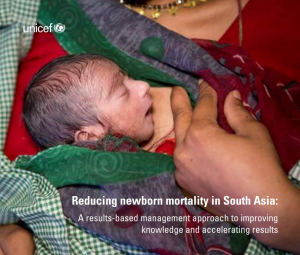
Reducing newborn mortality in South Asia
UNICEF’s Regional Office for South Asia (ROSA) has identified six Headline Results that receive special focus across programme areas in order to ensure that every child in South Asia is able to realise his or her full potential and rights.
Save Newborns is one of the six Headline Results. UNICEF has committed to support countries in South Asia to reduce newborn mortality from 32 per 1000 live births in 2013 to 25 per 1000 live births in 2017. This is in line with the Sustainable Development Goal (SDG) target of reducing global newborn deaths to at least as low as 12 per 1000 live births by 2030. South Asia is currently off-track to achieve both the South Asia and SDG targets. If current trends continue, South Asia will reduce newborn deaths to 20 per 1000 live births by 2030. There is significant work to be done. The potential benefits to children and their families are enormous. For example, if South Asia meets the 2017 target, an additional 300,000 newborn lives will be saved. This will require accelerated progress especially in high-burden countries such as Pakistan, Afghanistan and India.
This document presents UNICEF’s Strategy to reduce newborn deaths in South Asia. Related data on maternal deaths and stillbirths are also included. The key elements of a Results-Based Management approach are incorporated by focusing on: 1) evidence, analysis and a theory of change, 2) strategic planning and prioritisation, 3) implementation of programmatic approaches, 4) monitoring and evaluation using data, information and knowledge to adjust programming and, 5) reporting for accountability, transparency, advocacy and resource mobilisation.